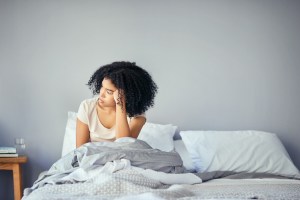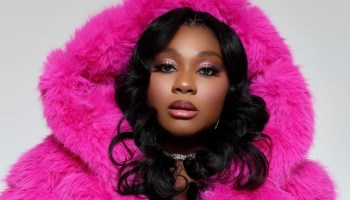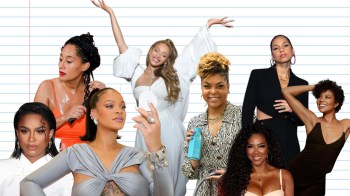
Source: LaylaBird / Getty
Addressing mental health in our community is a touchy subject—and it shouldn’t be given how many African-Americans are suffering from a form of depression and anxiety or mental illness such as bipolar disorder and schizophrenia.
According to the Health and Human Services Office of Minority Health, African Americans are 20 percent more likely to experience serious mental health problems than the general population. In addition, due to the multitudes of oppression and trauma we encounter on a daily basis—racism; police, community and sexual violence; sexism; poverty; higher rates of PTSD and homelessness; and homophobia—Black folks have higher levels of psychological distress. We are also more likely to have feelings of sadness, hopelessness, and worthlessness than are whites.
Yet in spite of these eye-opening stats, studies show that we are less likely to receive the care that we so desperately need. While our disconnect to mental health treatment can be blamed on lack of access to health care and the closing of mental health clinics in communities of color across the nation, it’s clear that stigma, misinformation, and our distrust with the medial community play a huge role too. Now add on the impact and stress from the coronavirus pandemic and you can see how this can be an even bigger issue.
So to honor Mental Health Awareness Month this May, we are debunking—once and for all—a few of the most popular mental health myths out there.
Myth 1: It’s Just “The Blues,” It Will Pass
Given how many curveballs life throws us, there will always be downs and moments of sadness here and there that will go away in time. But what happens when they don’t go away quickly? Or what happens if these lows are so low that they impact your ability to go to work, care for yourself or your family or put your life at risk? Would you be able to recognize that you need help?
Maybe not.
According to the National Alliance on Mental Illness (NAMI), African-Americans have a harder time identifying symptoms of mental health issues and are more likely to shrug it off as having “the blues” and believe that it will just pass on its own. This is potentially dangerous because it dismisses the seriousness of these disorders and it stigmatizes and shames those really help.
For too many this is beyond “just getting over it” and “toughening up.”
Myth 2: You Can Pray Your Depression Away
Having faith in a higher being is a beautiful thing—it can give one a stronger sense of self, usher in optimism and provide comfort. But prayer and religion alone cannot cure depression or other serious mental illnesses, nor does suffering from it mean the “devil” testing you or that God is punishing you for your sins.
If you are having issues that you can’t shake, you may need professional help and perhaps even medication. And that’s nothing to be ashamed of, you’re not “crazy” and this isn’t a sign that your faith isn’t strong enough.
Most of us would never say, “Oh this diabetes or heart disease will pass on its own,” so why is should our mental health be any different? Depression is treatable and needs just as much concern and care as your physical health.
Myth 3: Black Women Don’t Get Depressed! We Are Superwomen
No can deny that Black women are magic, wonderful, strong and pretty damn super, but that doesn’t mean that we are indestructible. We’re not Marvel comic book characters—we’re human, vulnerable and carry a lot on our shoulders.
We’re constantly “weary of the ways of the world” and that can take a huge toll on us. A 2012 report found that poverty, parenting, racial and gender discrimination put Black women — particularly low-income Black women — at greater risk for depression. We also experience higher rates of depression than white women and Black men.
Sadly, there aren’t enough outlets for us to talk about this because too many of us have been socialized that it’s our job to just endure pain and smile for the sake of our community as a whole. This is why we need to be the generation of Black women to break this cycle.
It’s OK for us not to be OK and to get the help we deserve and need.
Myth 4: Black Folks Don’t Commit Suicide
Studies do show that African-Americans have lower rates of suicide than other races and ethnicities, but please don’t ever think that this isn’t our issue. According to the Centers for Disease Control and Prevention, suicide is the fifth leading cause of death for Black girls ages 10-14 and women 25-24 but the third leading cause for teens ages 15-19. In addition and that a 2012 study found that Black women have a higher incidence of having suicidal thoughts due to racial and gender bias we experience.
Over the past few years, we’ve lost too many: Miss Jessie’s Titi Branch, activist blogger Karyn Washington, Black feminist author Erica Kennedy and Styles P’s daughter Tai Hing all committed suicide. There are also those who survived past attempts including Broadway legend Audra McDonald, Oscar-winner Halle Berry, singer Fantasia and even Oprah Winfrey. And those are just celebs—think of the everyday Black women that we don’t know or talk about.
Also keep in mind that suicide in our community crosses gender lines: The CDC found that suicide is the third leading cause of death of young Black men ages 10 to 24 and fourth for men 25-34.
If this doesn’t ring alarm, what else will?
Myth 5: Therapy Is For White People
Therapy is for everyone! And if Black folks are suffering from a range of issues and therapy is a popular and successful form of treatment, why can’t we claim this for our community?
Granted getting started is complicated and comes with a lot of anxiety and concerns:
I was taught to keep my business to myself.
If I seek outside help and talk about my childhood, will it reflect badly on my family?
If I tell anyone I have a therapist, they’ll think I’m crazy.
I don’t want to be one of those people who can’t handle their own problems.
But here’s the real truth: Our silence is literally making us sicker and wreaking havoc on our lives. Why suffer when we don’t have to?
There is no shame in needing or asking for help and please never lose sight on that the fact you have more control than you think. Do the research, find the right therapist for you and it’s OK to find a new one if your needs aren’t being met. (FYI: Looking for a Black therapist? Go here to find one.)
Therapy is a major step to being your best and healthiest you; don’t let fear stop you from taking that leap.
Learn more about mental health, identifying symptoms and how it impacts the Black community at nami.org.
RELATED NEWS:
Mental Health Awareness Month: How Your Job Is Making You Sick
Celebrities with Mental Health Disorders
CDC Study Finds Women Are More Likely Than Men To Suffer From Mental Health Issues





















